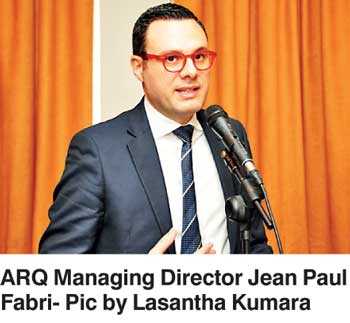Tuesday Feb 17, 2026
Tuesday Feb 17, 2026
Saturday, 5 May 2018 00:00 - - {{hitsCtrl.values.hits}}
 By Charumini de Silva
By Charumini de Silva
A top consultant on governance yesterday said tremendous potential existed for Sri Lanka to implement its Vision 2025 in an effective manner to usher a new era of growth provided regulations were progressive and implemented competently.
Addressing a business breakfast meeting themed ‘Malta Your Gateway to Europe,’ two top experts discussed opportunities for Sri Lankan businesses to access the European market through Malta and strategies to develop overall economic resilience in Sri Lanka.
It was pointed out that as a small island state characterised by inherent vulnerabilities, Malta had managed to carve its economic success and vision based on the power of regulation.
“Malta’s jurisdictional innovation has allowed it to build a thriving economy, generating quality jobs and sustaining a generous welfare state. One can define it in as an economic miracle, but it at its core lies the belief that regulation can provide opportunities. I think Sri Lanka’s Vision 2025 has the potential to translate it into a targeted sector-based strategy, coupled with a good mix of incentives and attractive regulations to usher a new era of growth,” ARQ Managing Director Jean Paul Fabri said.
He pointed out that resilience-building offered the potential for small island nations to not only build their capacity to absorb negative shocks, but more importantly it allowed countries to identify niche areas and to develop new economic sectors.
“Building resilience is a transformative process that builds on the capacity of individuals, their communities and institutions to lessen the impacts of shocks, internal or external, natural or manmade, economic, health-related, political or social. We believe that resilience-building has the potential of ushering a new era of growth in Sri Lanka,” he added.
The blue economy, plantation, logistics, regulations and e-Government were outlined as major opportunities that Sri Lanka could capitalise on, particularly in entering to the European Union (EU) economies.
Fabri called on Sri Lankan corporates to use Malta as a hub to access the massive EU single market as well as take advantage of being a Commonwealth member to enter the UK market in the post-Brexit.
He also emphasised on the need to carve out what is needed by the private sector and how Government can alleviate any problems to create new opportunities.
“Sri Lanka is in a path to a transformational change. It takes time, but through an incremental change prosperity will be created, jobs will created and standard of living will be improved. Most importantly it happens in a sustainable manner,” he added.
In addition to the tax incentives ARQ Partner David Borg said there were also other incentives, including EU membership, Commonwealth membership, trust and foundation, skilled workforce, good connectivity and cost effective.
Accordingly, the financial services sector, asset registration, manufacturing sector are the top most obvious examples largely contributing to a thriving economy.
“Today we have a robust financial jurisdiction that has attracted a diversity of players in sectors such as banking, insurance, trusts, funds and pension schemes. The sector remains a key contributor to economic activity. Asset registration such as the ship register, aviation and yachts are also prime examples of jurisdictional innovation,” Borg said.
It was noted that Malta continues to have one of the largest ship registers in the world and its aircraft register has already attracted some of the world’s largest players.
In terms of the manufacturing sector, primarily the pharmaceutical industry, it is Malta’s regulatory structure that has given birth to this important sector. In fact, pharmaceutical companies present in Malta set-up shop here to take advantage of the country’s legal framework that allows the development of generic drugs ahead of patent-expiry.
Borg also said because of the Brexit, they feel that the Commonwealth would once again give a lot more prominence by the UK and urge Sri Lanka who is also a member to capitalise on the opportunity by making Malta as a gateway to European market.
The event was presented by Blue Stone Management Ltd. and BBK Partnership Ltd. in association with the European Chamber of Commerce of Sri Lanka (ECSSL).